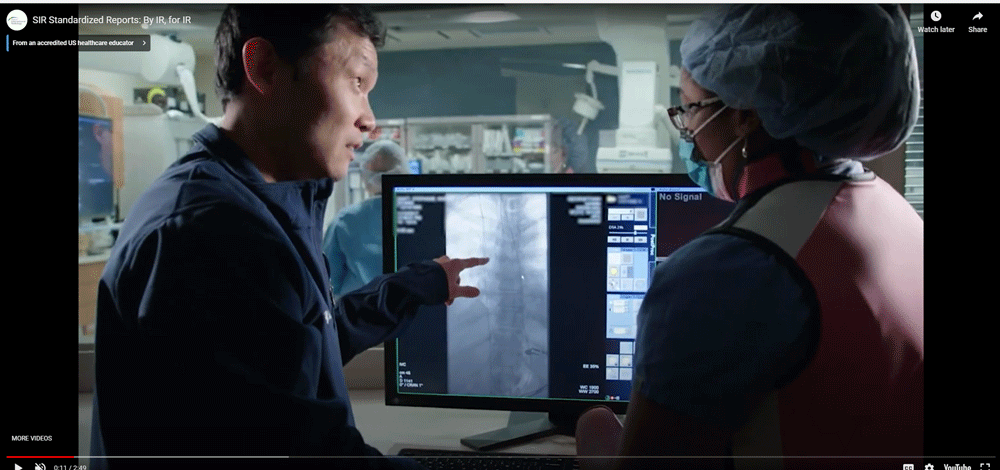Standardized reports
SIR’s standardized reporting initiative assists physicians with the integration of standardized and structured reporting into IR practice.
SIR’s standardized reports are designed to enhance healthcare efficiency and quality. Utilizing procedure-specific standardized reports ensures that valuable clinical data is communicated clearly without ambiguity.

Biopsy
BRTO-CARTO-PARTO
Central venous access
Diagnostic
Dialysis
Drainage
Gastrointestinal (GI)
Genitourinary (GU)
Hepatobiliary
Intervention
Interventional Oncology
Lymphatic
Musculoskeletal (MSK)
Neurointerventional Radiology
Pain Management
Pediatric
Peripheral Arterial
Portal vein
Venous
Shop the reports
Templates for participation in VIRTEX, the SIR Clinical Data Registry
Facilitates clinical and research data collection and drives practice quality improvement. Reports available in RTF and XML format, Version 3.1.
Shop the reports
What are the benefits of SIR standardized report templates?
Reimbursement
- Increased charge capture and improved accuracy of charge capture
Required elements for coding and billing are frequently missing in the dictated report. If services are billed without these elements, you and your practice may be at risk if audited. Conversely, if services are not billed, you are losing revenue for the service you have provided. Standardized reports prompt you to document those required elements. - Decreased denials
Denials occur for many reasons. Standardized reports can help reduce denials by directing you to include the appropriate documentation, diagnosis and indication. When the ICD code supports the medical necessity for the procedure, the claim is paid. The claim is automatically denied if the ICD does not support medical necessity. - Decreased report revisions
Coders may assist providers by asking for report revisions when they suspect key documentation is missing to ensure providers are appropriately billing for all services performed.
Standardized reports prompt you to include that key documentation in the initial report, decreasing billing costs and helping you get paid for all appropriate services provided. Unfortunately, many practices do not report revisions because they don't recognize the importance or do not have time. In addition, coders often do not have security in asking the providers to put the extra time in to revise the reports. - Includes appropriate coding and billing language
Work performed is not billable if not documented. For example, providers do a lot of analysis and decision-making while looking at images and assessing the patient, but if that is not documented, it cannot be billed. Standardized reports prompt you to include documentation for these services and the language required to document all required elements for billing a service.
Increased dictation efficiency
- Reports are designed to be highly efficient and quicker to use than narrative, free-text reports.
They are also modular and can be customized to physician and practice preferences and needs, including customizing devices, methods, defaults and merge fields/auto-import of data from additional systems (i.e., radiation dose), and if preferred, allowing for the inclusion of narrative and free-text modules
Increased referring physician satisfaction
- Report consistency enables referring providers to readily locate the necessary information.
Standardized lexicon
- Reduce subjectiveness, ambiguity and variability; improve clarity and data quality.
Allow users to "speak the same language," that is, to use standard terminology so that what one physician dictates means the same thing as what another physician dictates to describe the same disease, condition, procedure or outcome.
Allows for registry participation
As valuations for your services are developed by the RVS Value Committee (RUC) and by CMS, the methodology is shifting away from physician surveys, which have been fraught with bias and inaccuracy.
Instead, data is moving to real-world data (RWD) and real-world evidence (RWE) from registries and is currently used by other specialties. IR values cannot keep pace and be appropriately reflected without this data type.
-
Registry participation is vital to your practice for patient access to IR care, payment, coverage and for demonstrating value to your key constituents.
- Registry participation is proposed as a critical component of bonus payments for CMS.
- Registry data can be used to benchmark you/your practice, and that data is essential to your partners, hospital administration, referring physicians, patients and payors. In addition, you will need data to demonstrate your skills and value in the future.
- Coverage of IR services will depend on published data as we are rapidly moving away from fee-for-service (FFS) payments to payments based on quality. Without RWD, RWE and published data, coverage for services we "know" work will likely be reduced or denied. Therefore, your data is essential to publishing data that supports payment and coverage of IR services.
These reports are copyrighted by the Society of Interventional Radiology. Download and use of these templates indicates your agreement to use the files solely for your personal or facility use only. Users are not authorized to modify, change or otherwise improve the reports, except as indicated within the IR Standardized Reporting User Guide. Any reproduction, multi-use configuration or network distribution, transmission, publication, performance, broadcast, alteration, license, hyperlink, creation of derivative works or other use in whole or in part in any manner without the express prior written consent of SIR is strictly prohibited.
*Note: Standardized reports are provided in both rtf and xml PowerScribe-ready formats. New reporting templates will be generated and existing templates will be updated on an ongoing basis. Email virtex@sirweb.org for the previous version 3.0 reports.